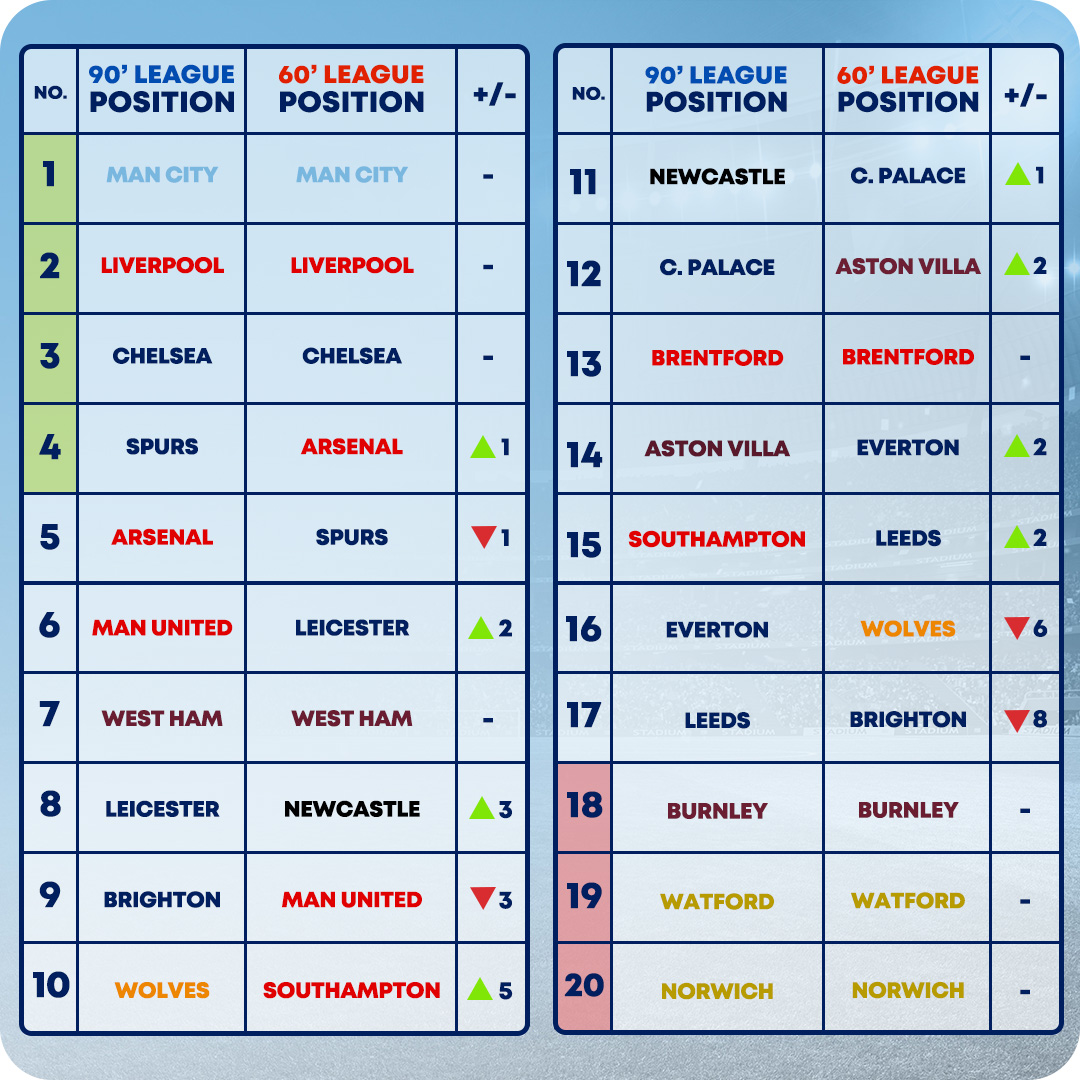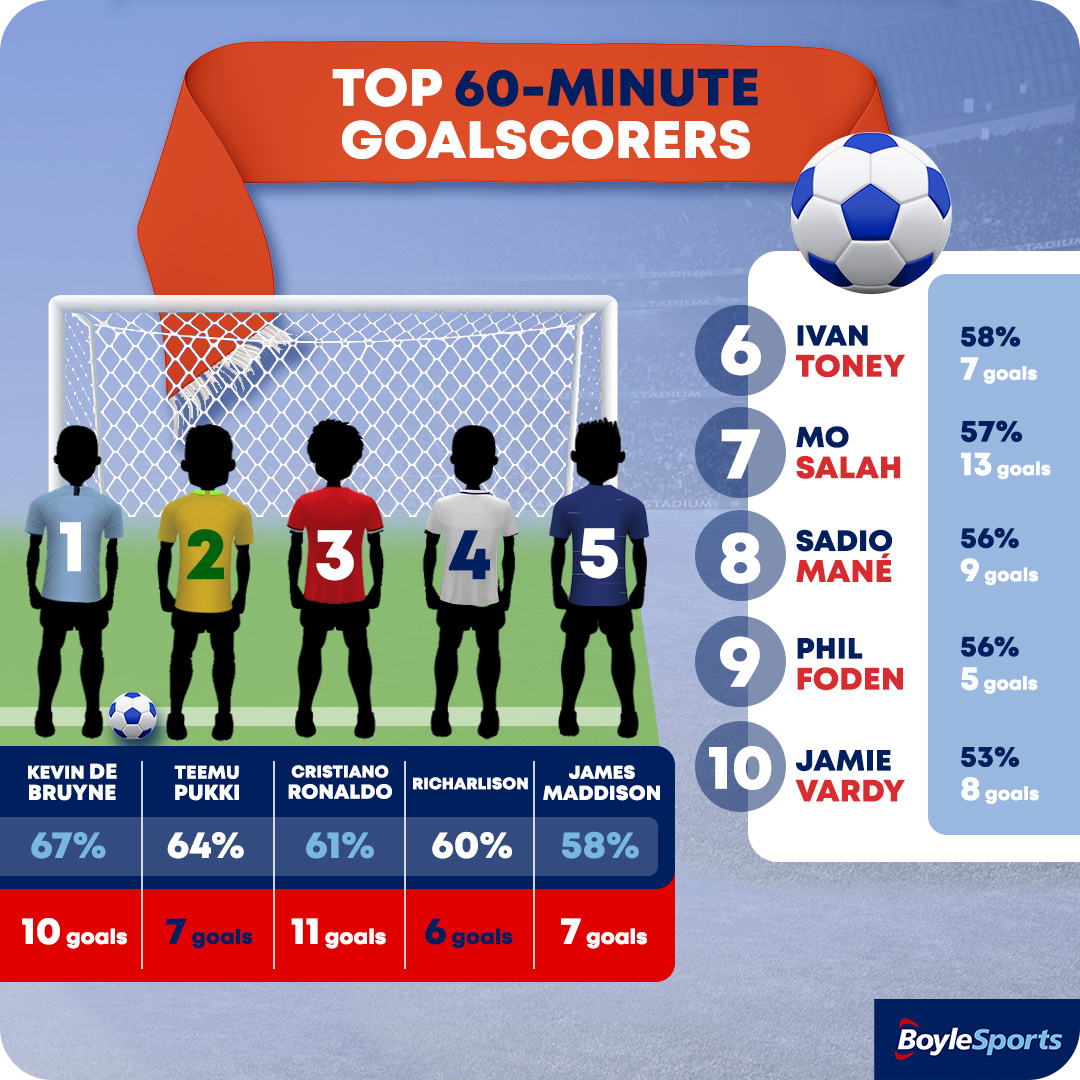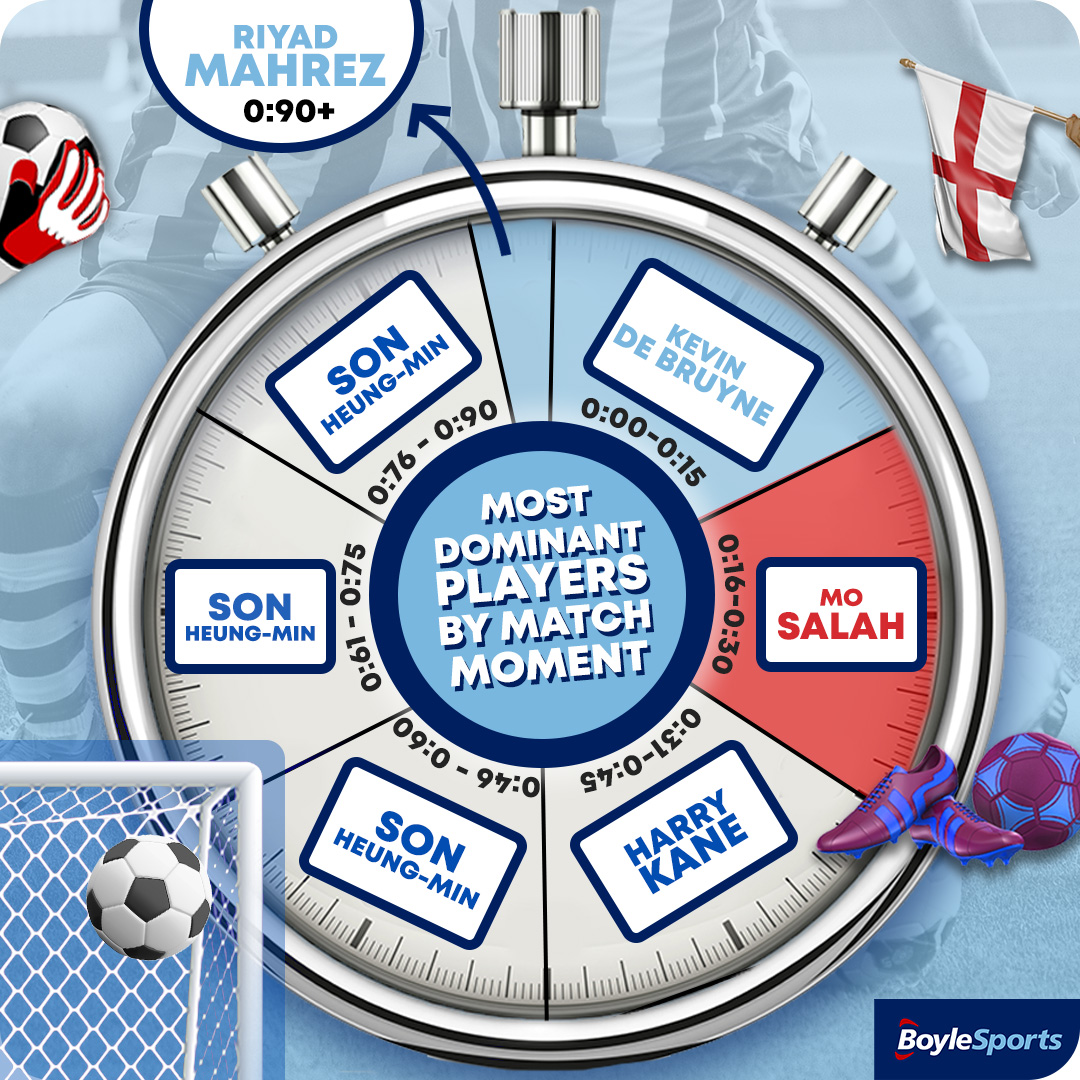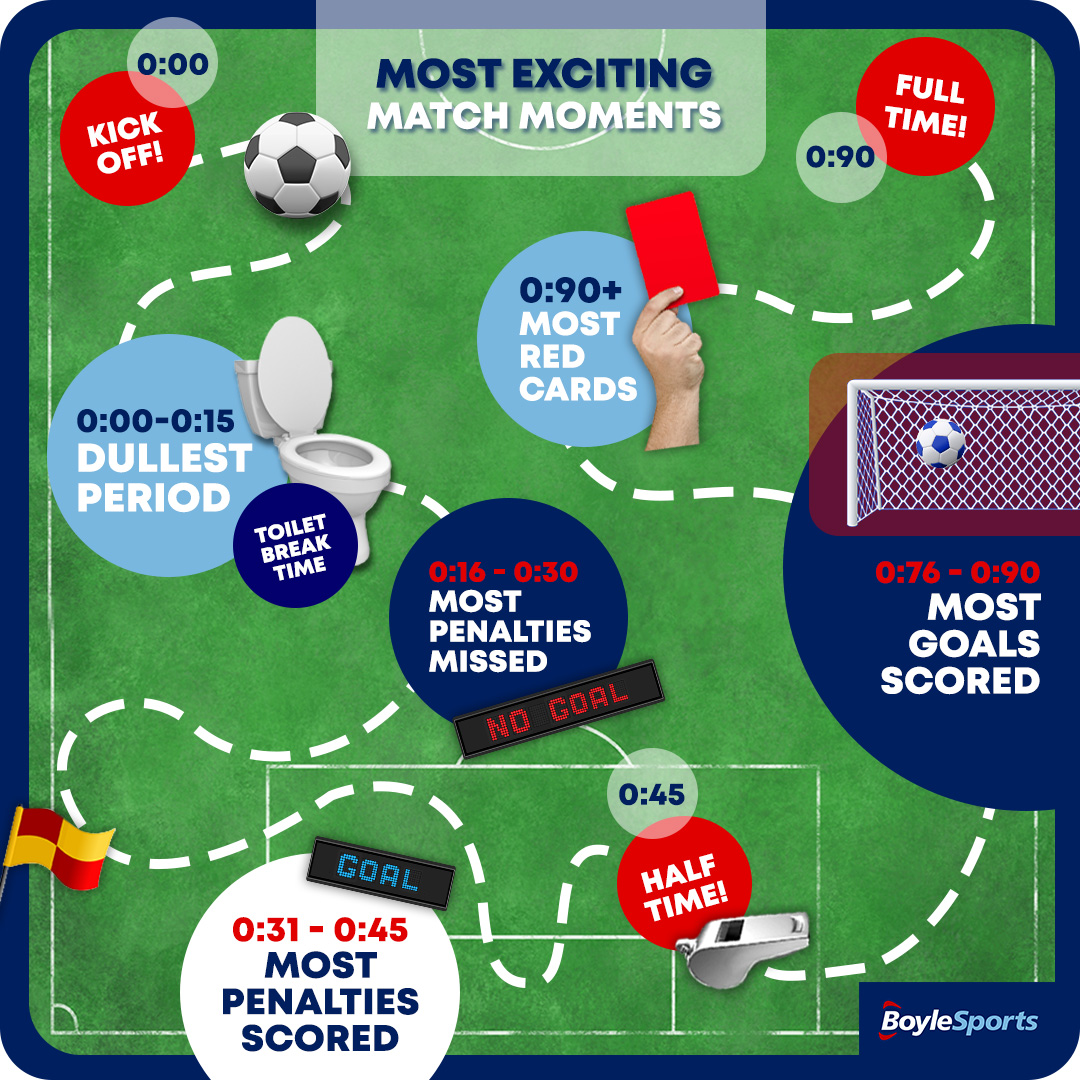The Premier League is back, and how we’ve missed it - but does football need to change to 60 minute games?
Every summer we might get updated guidance for the offside rule, or maybe a change to the number of subs, but we’re talking about a more fundamental shift!
For too long, gamesmanship and time-wasting have plagued the game, which has led to more and more people advocating for a 60-minute timestamped match. If the watch stops when the ball is out of play or a player’s rolling on the ground, you can’t time waste.
And with the average Premier League match in 2021/22 only having the ball in play for 55 minutes and three seconds, we’re all watching 60-minute matches anyway. Who knows, would a 60-minute match be more appealing to the TikTok generation?
But if this change did come in, how would it affect the Premier League? We set about finding out!
The data, features over 4500 time-stamped match events, including goals, cards and penalties.
We then visualised how the performance of different teams and players was impacted across the 90-minute matches. We were then able to identify outliers who either excel or flounder in key match intervals.
So how would the Premier League change with 60-minute matches?

The question is, what would 60-minute matches mean for the overall Premier League standings?
The big news comes from North London. Tottenham may have pipped their great rivals Arsenal to fourth spot and the final coveted Champions League place on the final day of the 2021/22 season, but that wouldn’t have happened if the matches were just 60 minutes long!
Instead, the Gunners would make fourth with Spurs having to make do with a Europa League place in fifth.
Pep Guardiola’s Manchester City would still take the title, with Liverpool and Chelsea once again coming in second and third respectively. Man United also drop down a couple of places for their worst ever Premier League finish in ninth.
The big story at the bottom of the table would be relegation for Brighton, with Burnley staying up. Graham Potter’s Brighton enjoyed their highest topflight finish in their history in 2021/22, securing ninth place.
From our data it’s clear that the Seagulls are strong finishers over 90-minutes, but not so over 60. They would be all the way down in 18th place in the Premier League and now playing Championship football if the matches were 60 minutes.
Eight teams in total would benefit from the shorter matches and finish higher in the table – Leicester, Newcastle, Southampton, Crystal Palace, Aston Villa, Everton, Leeds, Arsenal and Burnley.

But what about the individual performers? How would the 60-minute match change affect them?
Man City’s Kevin De Bruyne is king of the 60 minute match, with the Belgian schemer scoring 67% of his goals during 60 minutes, and just 5% in the last 30 minutes.
Teemu Puuki is up there in second with a scoring rate of 64% in 60 minutes, followed by Cristiano Ronaldo on 61% and Richarlison on 60%.
It sounds pretty juicy doesn’t it? A front three of Ronaldo, Puuki and Richarlison with De Bruyne pulling the strings in midfield. These are the players you want in your 60-minute matches.
But for those at the other end of the spectrum, we’re seeing Son Heung-min scoring 57% of his goals in the final 30 minutes, as well as Raheem Sterling on 62% and Conor Gallagher on 63%.
City are such a well-drilled machine, they’d still be flying at the summit of the Premier League regardless of the length of match. It’s clear that the combination of De Bruyne during 60 minutes and Sterling in the last 30 is a real winner.
But with Son so much stronger for Spurs in the latter third of games, is this the reason Tottenham’s top four hopes would be dashed in the 60-minute format?

So, which players do you want in your side over 60 minutes?
We know City’s De Bruyne is the dominant player in terms of goals across 60 minutes, but he’s also the strongest in the first 15 minutes of the match, with five goals in this period. He’s the fastest Premier League player out of the blocks in terms of goals.
Liverpool’s Mo Salah then takes on the mantle until the half hour mark, again bagging himself five goals.
Moving onto the second half of our 60-minute matches, it’s all about Spurs with Harry Kane the dominant force during the 31-45 minute mark with seven goals, followed by his partner in crime Son with five goals from 45-60 minutes.

They say the Premier League is the most exciting league in the world, but when does it hit peak excitement?
Well, it’s all about the second half, and specifically the final 30 minutes of matches. From 76 to 90 minutes, we saw the highest percentage of events happening (28%). This includes the most goals (17% of goals scored) and the most subs (39%).
The 15 minutes before isn’t too bad either, with 26% of the action happening from 61 to 75 minutes. The action at this time includes the most yellow cards (33%), a high percentage of own goals (23%), the most penalties (19%) and the most penalty misses (21%).
Which begs the question, if we did cut Premier League matches to 60 minutes would it be a borefest without the action of the last 30 minutes or would the second half of the new format then become all-action?
There’s only one way to find out. Despite what some football fans might think, the Premier League isn’t always packed with action.
So, when’s the best time to nip to the toilet or make a brew? The dullest period of a Premier League match is the first 15 minutes, with just 5% of the action occurring – although 14% of the goals do happen during this period. And you might miss an own goal too, with 24% occurring in the first 15 minutes.
Good luck if you do decide to nip to the loo!
Remember, always gamble responsibly. Here's our Safer Gambling Guide.
Think you know which players will hit the ground running in the Premier League and which teams will be floundering at the start of the season?
You can bet on all the top flight action with our Premier League betting at BoyleSports.
Plus, we also bring you all the football betting markets you need ahead of the new season. From the outright Premier League and Champions League winners to which teams you think will face the dreaded drop and which managers will be first for the chop.
FANTASY5 HAS RETURNED FOR THE 2022/23 PREMIER LEAGUE SEASON - FREE TO PLAY!

BOOST OR INSURE? MAKE YOUR CHOICE ON YOUR ACCA RIGHT HERE! T&Cs APPLY

FREE LIVE STREAMING ON A NUMBER OF SPORTS - JUST LOG IN!

Every summer we might get updated guidance for the offside rule, or maybe a change to the number of subs, but we’re talking about a more fundamental shift!
For too long, gamesmanship and time-wasting have plagued the game, which has led to more and more people advocating for a 60-minute timestamped match. If the watch stops when the ball is out of play or a player’s rolling on the ground, you can’t time waste.
And with the average Premier League match in 2021/22 only having the ball in play for 55 minutes and three seconds, we’re all watching 60-minute matches anyway. Who knows, would a 60-minute match be more appealing to the TikTok generation?
But if this change did come in, how would it affect the Premier League? We set about finding out!
THE RESEARCH
We scraped the web to harvest all match events from the 380 matches of the 2021/22 Premier League season.The data, features over 4500 time-stamped match events, including goals, cards and penalties.
We then visualised how the performance of different teams and players was impacted across the 90-minute matches. We were then able to identify outliers who either excel or flounder in key match intervals.
So how would the Premier League change with 60-minute matches?

The question is, what would 60-minute matches mean for the overall Premier League standings?
The big news comes from North London. Tottenham may have pipped their great rivals Arsenal to fourth spot and the final coveted Champions League place on the final day of the 2021/22 season, but that wouldn’t have happened if the matches were just 60 minutes long!
Instead, the Gunners would make fourth with Spurs having to make do with a Europa League place in fifth.
Pep Guardiola’s Manchester City would still take the title, with Liverpool and Chelsea once again coming in second and third respectively. Man United also drop down a couple of places for their worst ever Premier League finish in ninth.
The big story at the bottom of the table would be relegation for Brighton, with Burnley staying up. Graham Potter’s Brighton enjoyed their highest topflight finish in their history in 2021/22, securing ninth place.
From our data it’s clear that the Seagulls are strong finishers over 90-minutes, but not so over 60. They would be all the way down in 18th place in the Premier League and now playing Championship football if the matches were 60 minutes.
Eight teams in total would benefit from the shorter matches and finish higher in the table – Leicester, Newcastle, Southampton, Crystal Palace, Aston Villa, Everton, Leeds, Arsenal and Burnley.
Which players fly out the blocks or dominate late?

But what about the individual performers? How would the 60-minute match change affect them?
Man City’s Kevin De Bruyne is king of the 60 minute match, with the Belgian schemer scoring 67% of his goals during 60 minutes, and just 5% in the last 30 minutes.
Teemu Puuki is up there in second with a scoring rate of 64% in 60 minutes, followed by Cristiano Ronaldo on 61% and Richarlison on 60%.
It sounds pretty juicy doesn’t it? A front three of Ronaldo, Puuki and Richarlison with De Bruyne pulling the strings in midfield. These are the players you want in your 60-minute matches.
But for those at the other end of the spectrum, we’re seeing Son Heung-min scoring 57% of his goals in the final 30 minutes, as well as Raheem Sterling on 62% and Conor Gallagher on 63%.
City are such a well-drilled machine, they’d still be flying at the summit of the Premier League regardless of the length of match. It’s clear that the combination of De Bruyne during 60 minutes and Sterling in the last 30 is a real winner.
But with Son so much stronger for Spurs in the latter third of games, is this the reason Tottenham’s top four hopes would be dashed in the 60-minute format?
Controlling the clock: Which players dominate at each interval?

So, which players do you want in your side over 60 minutes?
We know City’s De Bruyne is the dominant player in terms of goals across 60 minutes, but he’s also the strongest in the first 15 minutes of the match, with five goals in this period. He’s the fastest Premier League player out of the blocks in terms of goals.
Liverpool’s Mo Salah then takes on the mantle until the half hour mark, again bagging himself five goals.
Moving onto the second half of our 60-minute matches, it’s all about Spurs with Harry Kane the dominant force during the 31-45 minute mark with seven goals, followed by his partner in crime Son with five goals from 45-60 minutes.
The most exciting time of the match vs the best time to go to the toilet

They say the Premier League is the most exciting league in the world, but when does it hit peak excitement?
Well, it’s all about the second half, and specifically the final 30 minutes of matches. From 76 to 90 minutes, we saw the highest percentage of events happening (28%). This includes the most goals (17% of goals scored) and the most subs (39%).
The 15 minutes before isn’t too bad either, with 26% of the action happening from 61 to 75 minutes. The action at this time includes the most yellow cards (33%), a high percentage of own goals (23%), the most penalties (19%) and the most penalty misses (21%).
Which begs the question, if we did cut Premier League matches to 60 minutes would it be a borefest without the action of the last 30 minutes or would the second half of the new format then become all-action?
There’s only one way to find out. Despite what some football fans might think, the Premier League isn’t always packed with action.
So, when’s the best time to nip to the toilet or make a brew? The dullest period of a Premier League match is the first 15 minutes, with just 5% of the action occurring – although 14% of the goals do happen during this period. And you might miss an own goal too, with 24% occurring in the first 15 minutes.
Good luck if you do decide to nip to the loo!
Remember, always gamble responsibly. Here's our Safer Gambling Guide.
Think you know which players will hit the ground running in the Premier League and which teams will be floundering at the start of the season?
You can bet on all the top flight action with our Premier League betting at BoyleSports.
Plus, we also bring you all the football betting markets you need ahead of the new season. From the outright Premier League and Champions League winners to which teams you think will face the dreaded drop and which managers will be first for the chop.
FANTASY5 HAS RETURNED FOR THE 2022/23 PREMIER LEAGUE SEASON - FREE TO PLAY!

BOOST OR INSURE? MAKE YOUR CHOICE ON YOUR ACCA RIGHT HERE! T&Cs APPLY

FREE LIVE STREAMING ON A NUMBER OF SPORTS - JUST LOG IN!



